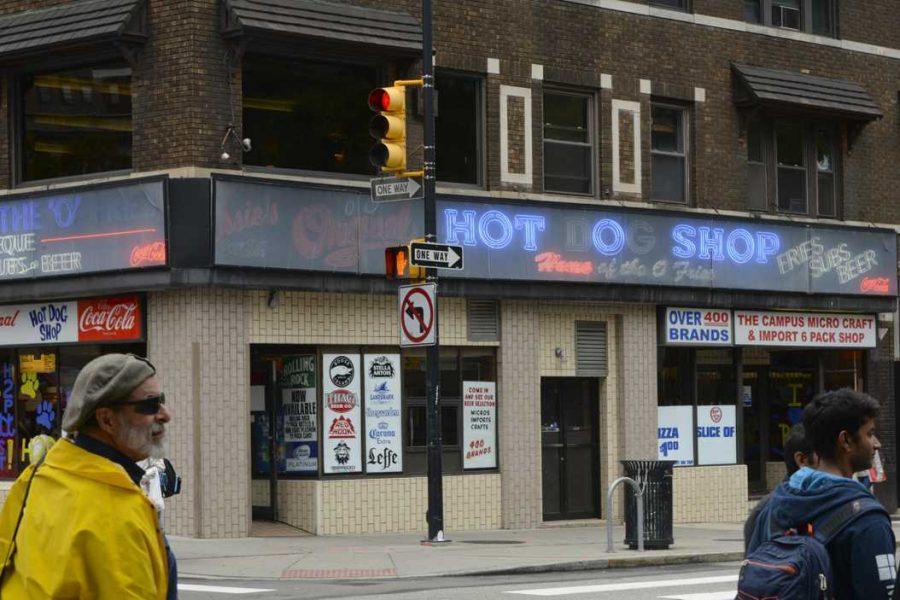New restaurants to replace The O
Essie’s Original Hot Dog Shop, affectionately known as The O among Pittsburgh residents, was a hot dog shop located in the heart of Oakland that recently closed down after about 60 years of operation.
November 16, 2020
The former home of The O at the corner of Forbes Avenue and South Bouquet Street will soon be filled.
Essie’s Original Hot Dog Shop, affectionately known as The O by Pittsburgh residents, closed in April after about 60 years of operation. Mero Restaurant Group, a locally owned and operated restaurant company, will soon put two new restaurants in its place in spring 2021.
Mero, which also operates Stack’d and CHiKN on Forbes Avenue, intends to renovate the space, splitting it into two sections. One of the new restaurants will be a location of the Delaware-based Capriotti’s Sandwiches. Mero will use the other half to debut Viva Los Tacos, a new taco-focused restaurant with a Southern California theme, two floors and a full bar.
Over the many years of The O’s operation, students at Pitt have created countless traditions and memories, from making great friends and memories to attracting some of the greatest football players of all time. Chas Bonasorte, who graduated from Pitt in 1974, had a tradition of going to The O after football games during the days when Pitt played at its former stadium just a few minutes up Cardiac Hill.
“Everybody came from all over to go to The O. Whenever the Pitt stadium was here in [Oakland], it was a tradition,” Bonasorte said. “My dad and my uncle would bring me, my brother and my cousin and we would stop at The O. They had the best hot dogs and french fries in the world.”
Bonasorte said he made many memories at The O during his college years, when The O was open until 4 a.m.
“It would be like 1:30 a.m. and we would be in The O,” Bonasorte said. “It would be packed on the weekends.”
Bonasorte, who has owned and operated The Pittsburgh Stop clothing company for the past 33 years, said new restaurants in Oakland had a hand in putting The O out of business.
“Over the years, the competition with food got really bad. [Only] three businesses have been here since I’ve been here for 33 years,” Bonasorte said. “There’s way, way more food [now]. Back in the old days, they didn’t have half the places you can go to now, [so that] took a chunk outta [The O’s] money, and when they tore the stadium down, that’s when they really died. During basketball season they still do good, but there’s only seven to eight thousand [seats in the stadium].”
But even with all its renowned hot dogs and fries, many people have only heard of The O, especially first-year students. Edwin Noel, a first-year mechanical engineering major, said he was never able to go to The O, but from what he’s heard from his friends, it holds a special place in many Pitt students’ hearts.
“The people who live near here went to it a lot and when they closed, people were upset and everything,” Noel said. “And I guess, I’ve never been there, but I guess they served really good food, really good hot dogs.”
Tim Park, a senior neuroscience and math major, said The O helped him make a connection with a new friend.
“I got to know one of my close friends [at The O]. We got food together, which was the first time [we had done that],” Park said. “It was just really memorable [because] The O was the spot where I really got close with her, and she’s still a close friend of mine now.”
Even with its dip in customers, Park said The O was still the most iconic restaurant in and around the Oakland area.
“The O was just so iconic because when you look back at old pictures of Forbes Avenue, you see different shops come and go, but the one thing that kinda stood the test of time was The O,” Park said. “As a customer I would walk in and they have the same decor, same menu items, same marketing. They didn’t have to change anything about themselves and they were still able to be successful for decades, [which] is [just] a testament to how good they are.”








